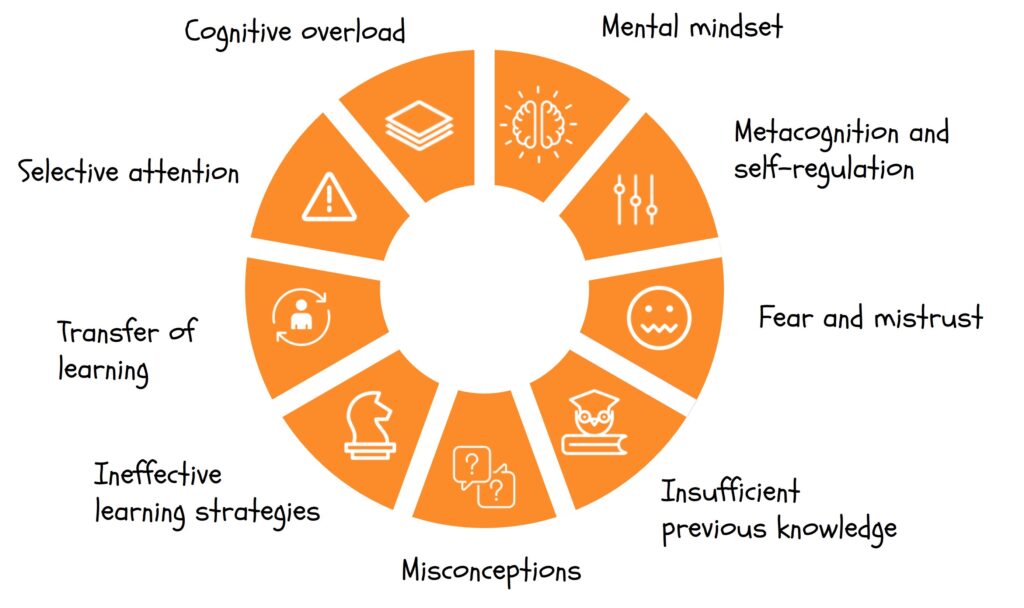The goal of university teaching is achieve optimum learning for “all” students. At the same time, this poses the greatest challenge. Optimum learning is not necessarily reflected by good grades but by the integration of new knowledge in the students’ own understanding. Students who learn optimally also concern themselves with the course topics taught when they are outside the course as well, and they connect them up with the knowledge they already have and with their daily lives.
So how can we foster this type of learning in our teaching? Chew and Cerbin’s (2020) answer to that is effective teaching (p.2). For Chew and Cerbin (2020), effective teaching means that learning environments arise that are based on cognitive principles and enable the transfer of knowledge. They developed a conceptual framework consisting of nine aspects which they call cognitive challenges for lecturers. Whenever they are designing a learning environment for students, lecturers should take these challenges into account:

1. Mental Mindset
Students’ mental mindset refers to their beliefs and expectations with regard to a course or discipline. However, it also refers to how likely they are to succeed in this course themselves due to their own efforts – hence, the students’ perceived academic self-efficacy. Farrington (2013) identified four beliefs held by students which create a successful mental mindset and which lecturers should therefore foster:
- I belong to this academic community.
- I can be successful here.
- My skills and abilities increase with my effort and commitment.
- I find this work valuable.
From the first day on, lecturers should highlight what value and significance a course has for the students. The content could be relevant with regard to an occupation later on, their general education or other disciplines, for example. Showing the relevance of content promotes the self-efficacy and motivation of the students. Formative assessment likewise has a positive effect on academic self-efficacy, as it influences how students experience their competence and their learning success.
2. Metacognition and self-regulation
Learning autonomously is decisive for your learning success when studying at university. In these self-learning phases, students need to regulate and control their own cognitive processing of knowledge and their learning behaviour successfully. For many students this is often difficult. Students like to put off learning and revision (procrastination; Fentaw, Moges & Ismail, 2022) or do not stick with it long enough to be able to really integrate and understand the learning content. Furthermore, they often do not check the quality of their learning enough. Although the quantity (learning time, scope of material) may sometimes be great, the learning quality is not sufficient for them to be truly successful.
By asking control questions in a task, lecturers can repeatedly challenge or encourage their students to check their own learning and adapt it where necessary. Students should provide information about their learning process and their approach when learning. That way, lecturers can identify ineffective learning behaviour early on and help students to adapt their learning processes by giving them appropriate feedback. Likewise, giving students small practice tests frequently can repeatedly provide them with feedback about where they stand and whether or not their current approach to learning is working.
3. Fear and mistrust
If students are afraid of a course or do not trust their lecturers, this will have a negative effect on the learning process and hence on their learning success. Fear and mistrust often lead to misunderstandings and problems in communication between students and lecturers. Sometimes, students cannot relate to the goals of a course or understand why certain methods are chosen, or they have doubts about what a course requires of them. If that is the case, it will not be possible to create an atmosphere that facilitates successful learning.
To avoid this, lecturers should create a sense of trust right from the start by showing that they are competent concerning the course topics. Furthermore, it is important for them to show integrity, meaning that they act reliably, responsibly and with fairness. It also matters that lecturers show how important the individual development of each student is. They select the tasks accordingly and provide help and resources (Chew & Cerbin, 2020).
4. Insufficient previous knowledge
Previous knowledge forms the foundation on which new knowledge can be built. If that foundation is not stable enough, new building blocks of knowledge will sit precariously and gaps will rapidly appear – something that will inevitably lead to difficulties with learning. Unfortunately, the majority of students only do moderate preparation for the next seminar sessions if at all (NSSE 2016, 2017, cited according to Chew & Cerbin, 2020), so that gaps in knowledge not only get wider quickly but cannot be closed before exams either. Online quizzes and questions that have to be worked on and submitted as preparation help students to prepare for sessions regularly. A certain degree of social pressure is often sufficient to get students to prepare.
5. Misconceptions
If students’ previous knowledge contains gaps or inaccuracies, misunderstandings and false assumptions can quickly arise and sometimes be hard to rectify. Lecturers can identify these false assumptions with the help of diagnostic tests and can address them in the course. It is not always possible to clear up the misunderstandings simply by presenting the “correct” information, however (Taylor & Kowalski, 2014). Studies analyse different teaching methods that can counteract the misunderstandings. One of these methods is the Predict-Observe-Explain strategy (POE).

6. Ineffective learning strategies
Students tend to apply learning strategies they are already familiar with, regardless of whether they are suitable for understanding the learning content in question. This has a negative effect on learning success, of course, and leads to weaker performance.
Lecturers have two options when it comes to dealing with this problem:
- they can teach and show the students effective learning methods directly or
- they integrate the implementation of effective learning strategies into the actual course by developing tasks accordingly.
One example of this is regular practice tests of new knowledge and the repetition of this knowledge at greater and greater intervals (Dunlosky & Rawson, 2015).
7. Transfer of learning
One important but also difficult goal is for students to be able to apply knowledge learned to new problems. The knowledge often remains passive and can only be retrieved in the context in which it was learned. Unfortunately, good exam results are not an indication of a transfer of learning having taken place. Lecturers should therefore design their teaching so that it is appropriately practice-orientated by including a large number of authentic worked examples. In addition, students should assume an active role by helping to shape their own learning process and by participating in the construction and application of the knowledge elements (Engle et al., 2012). Furthermore, the transfer of knowledge can be promoted with the aid of small application tests given regularly and with the kind of feedback the students receive.
8. Selective attention
Undivided attention is an important requirement for learning being possible at all. Although students think they can multitask and that they can be on social media and pay close attention in class at the same time, a string of studies have shown that divided attention leads to failure and poor performance (Glass & Kang, 2019). That is why distractions during lectures and seminars should be kept to a minimum.
9. Cognitive overload
If students cannot concentrate fully on learning new knowledge (divided attention), this can quickly lead to extraneous cognitive overload. Likewise, the learning content can exceed students’ cognitive capacity due to its quantity or complexity (intrinsic cognitive load). According to the cognitive load theory, the teaching should therefore include as few external distractions as possible and learning content should be prepared in such a way that students can connect it up to previous knowledge, acquire it actively and repeat it. That way, new knowledge can be stored in the long-term memory. The blog entry “Less is more: Four of the many ways to reduce cognitive load” provides helpful tips for keeping the unnecessary cognitive load of students to a minimum in lectures and seminars.
According to Chew and Cerbin (2020), the nine cognitive challenges determine students’ learning as a whole and are each of equal importance. Lecturers always need to take them all into account to foster optimum learning. Furthermore, the cognitive challenges impact each other. The learning process of students with a high level of previous knowledge of a subject is often successful, for example. One of the reasons for this is that they apply learning strategies successfully. However, their learning strategies may not be as effective for students with little previous knowledge. Hence, there is no one specific strategy for good teaching that fits every student, every topic and every learning situation. Teaching therefore needs to be flexible and teaching methods need to be continuously reviewed and adapted.
References
Chew, S. L. & Cerbin, W. J. (2020). The cognitive challenges of effective teaching, The Journal of Economic Education, 52(1), 17-40. https://doi.org/10.1080/00220485.2020.1845266
Dunlosky, J., & Rawson, K. A. (2015). Practice tests, spaced practice, and successive relearning: Tips for classroom use and for guiding students’ learning. Scholarship of Teaching and Learning in Psychology, 1 (1), 72–78. https://doi.org/10.1037/stl0000024
Engle, R. A., Lam, D. P., Meyer, X. S., & Nix, S. E.(2012). How does expansive framing promote transfer? Several proposed explanations and a research agenda for investigating them. Educational Psychologist, 47 (3), 215–231. https://doi.org/10.1080/00461520.2012.695678
Farrington, C. A. (2013). Academic mindsets as a critical component of deeper learning. Chicago, IL: University of Chicago, Consortium on Chicago School Research. https://www.howyouthlearn.org/pdf/White_Paper_
Academic_Mindsets_as_a_Critical_Component_of_Deeper_Learning_Camille_Farrington_April_20_2013.pdf.
Fentaw, Y., Moges, B. T., & Ismail, S. M. (2022). Academic Procrastination Behavior among Public University Students. Education Research International, 5, 1-8. https://doi.org/10.1155/2022/1277866
Glass, A. L., and M. Kang. 2019. Dividing attention in the classroom reduces exam performance. Educational Psychology, 39 (3), 395–408. https://doi.org/10.1080/01443410.2018.1489046
Taylor, A., & Kowalski, P. (2014). Student misconceptions: Where do they come from and what can we do? In V. A. Benassi, C. E. Overson & C. M. Hakala, (Eds), Applying science of learning in education: Infusing psychological science into the curriculum, (pp. 259–273). Washington, DC: Society for the Teaching of Psychology. https://teachpsych.org/ebooks/asle2014/index.php.
Suggestion for citation of this blog post
Rottmeier, S. (2023, May 4). Nine obstacles to effective teaching. Lehrblick – ZHW Uni Regensburg. https://doi.org/10.5283/ZHW.20230504.EN

Stephanie Rottmeier
- Stephanie Rottmeier#molongui-disabled-link
- Stephanie Rottmeier#molongui-disabled-link
- Stephanie Rottmeier#molongui-disabled-link
- Stephanie Rottmeier#molongui-disabled-link





